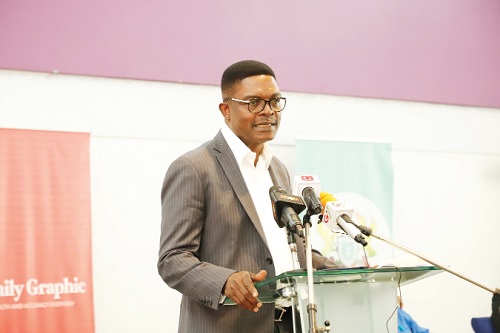
IDEG boss advocates effective transition management
The Executive Director of the Institute of Democratic Governance (IDEG), Dr Emmanuel Akwetey, has stressed the importance of managing the often overlooked transitions in the country’s democratic process, especially transitioning from one government to another after a government has served two terms.
He stated that if the transfer of power was effectively managed, it would benefit the country’s democratic credentials, ensure stability and maintain continuity.
Dr Akwetey, who had previously proposed the establishment of a Transitional Commission to ensure a smooth handover of power from one democratically elected administration to another, said this in an interview with the Daily Graphic on the sidelines of the fourth edition of the Graphic National Development Series (GNDS held at the British Council Hall in Accra last week.
That commission, he said, would have helped to rationalise, harmonise and modernise the country’s transitional rules, procedures, customs and practices.
The GNDS on elections on the theme: “Sustaining Civic & Democratic Governance System for Development, Mandate of All Citizens”, was the last in the series for this year.
The development series is a thought leadership national platform of the Graphic Communications Group Ltd (GCGL), carefully structured to steer strategic national discourse away from a partisan stance to reach outcomes of a national character behind which the country can rally for development.
The event brought together key stakeholders, including political parties, EC officials, national security officials, National Peace Council members, local authorities and traditional and religious leaders to provide updates on measures being taken to ensure peaceful, transparent and credible elections.
Transition process
Dr Akwetey said his concerns about the transition process stemmed from the situation where Parliament had been shut down a few days before the December 7 general election, hence the need for things to be managed properly to avoid any crisis.
"With the elections just around the corner, getting Parliament to address outstanding issues will be challenging," he said, adding, “The issue of transfer of power should have been factored into the parliamentary schedule; unfortunately, they were not. We are now in a situation where time is of the essence."
"The Constitution is clear and specific on dates, and it is crucial that we adhere to these timelines to avoid any potential crisis," he stressed.
The upcoming elections would see the incumbent President, Nana Addo Dankwa Akufo-Addo, step down after completing his constitutional term limits. A new government would also be in place after December 7, which could potentially create a challenge in the transition process.
Dr Akwetey emphasised the need for cooperation between the ruling party and the opposition to ensure a smooth transition.
Parliament’s role
The Executive Director of IDEG said Parliament had many critical tasks to complete before the elections, including passing a transition budget and approving international agreements.
"There are various signed-up international agreements that need to be approved and bills that should be passed, including the one dealing with Members of Parliament (MPs’) gratuity," Dr Akwetey said.
“These things do not usually require the majority that you see them fighting to have prepared. They can work in committee sessions and so on,” the governance expert added.
Dr Akwetey expressed concern that the current political climate was not conducive to completing these tasks and that the country was facing a potential crisis.
"The country needs money; there are loans to sign, and all these things are now on a standstill, including transition arrangements that should be made," he said.
“In committee sessions, Members of Parliament from both sides can work together to build consensus and address outstanding issues," he said.
He urged Parliament to find a way to complete its outstanding tasks before the January 7, 2025, handover.
"We must find a way to tackle these issues quickly to avoid any potential crisis," he stressed, adding, "The future of Ghana's democracy depends on it."
Role of CSOs
He also stressed the importance of the role of civil society organisations (CSOs) to the transition period, which he said, was crucial in sustaining civic and democratic governance.
That, he said, was particularly important during transitions as it ensured that the democratic process was maintained, even after a change in government.
Dr Akwetey identified two phases that made separate demands on civil society, with the first phase occurring when a new president took office and immediately began governing.
"The next day, they will announce their appointments, and then their programme is unleashed," he said.
“The second phase involves the actual transition process, where the outgoing government hands over power to the incoming government. This phase requires careful management to ensure a smooth transition,” he said.
